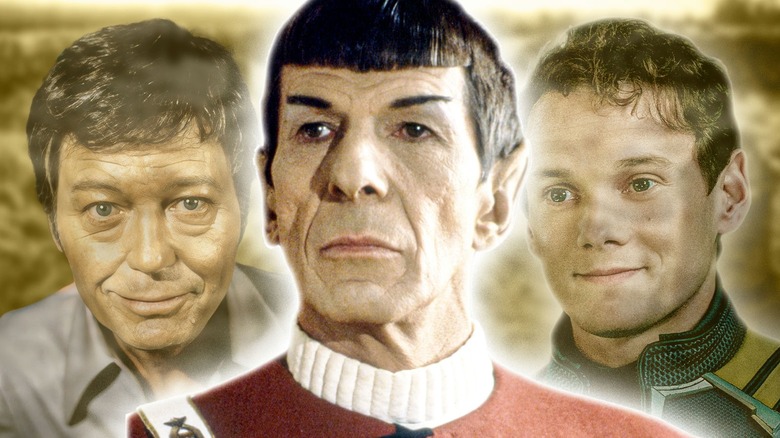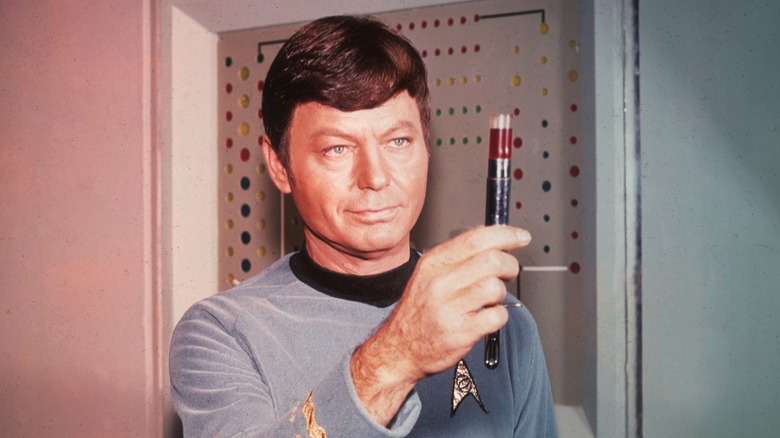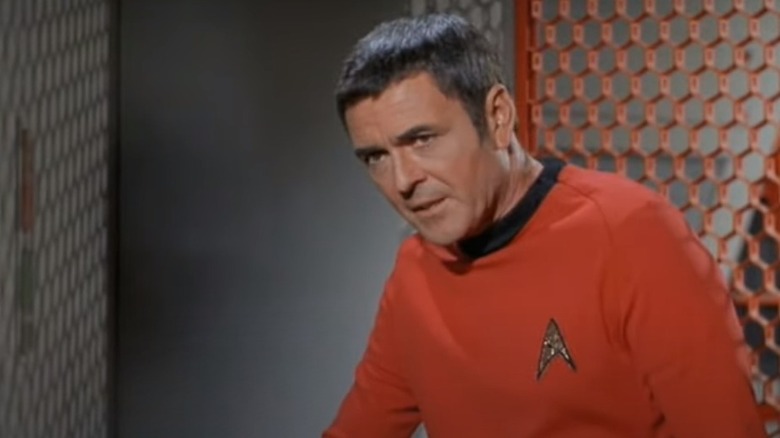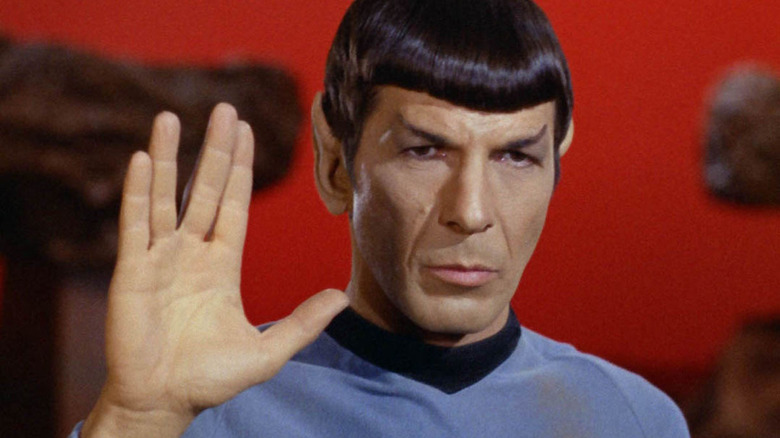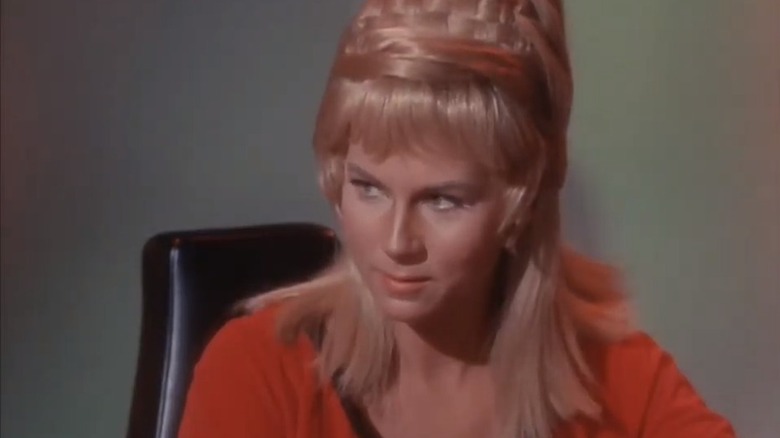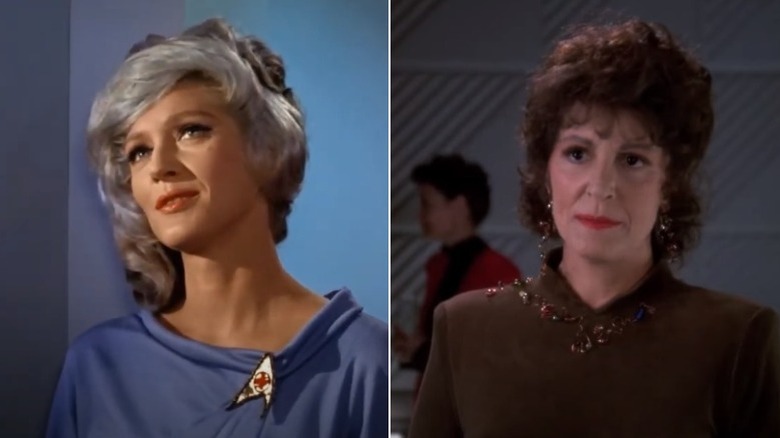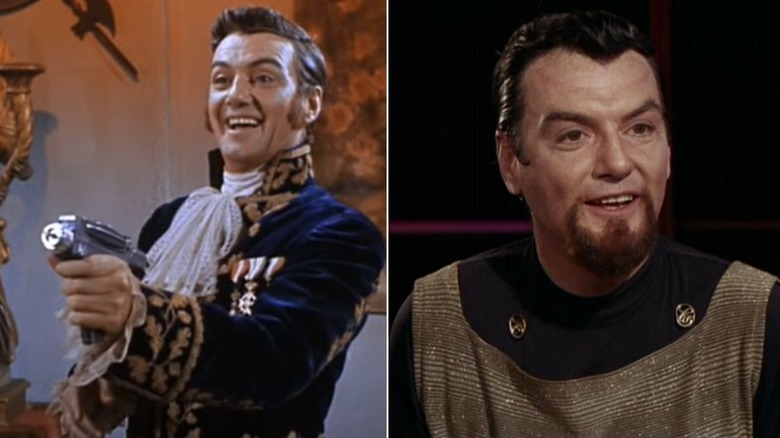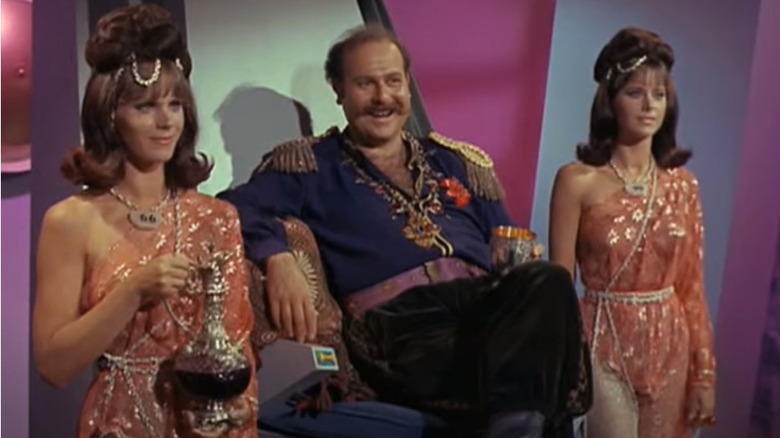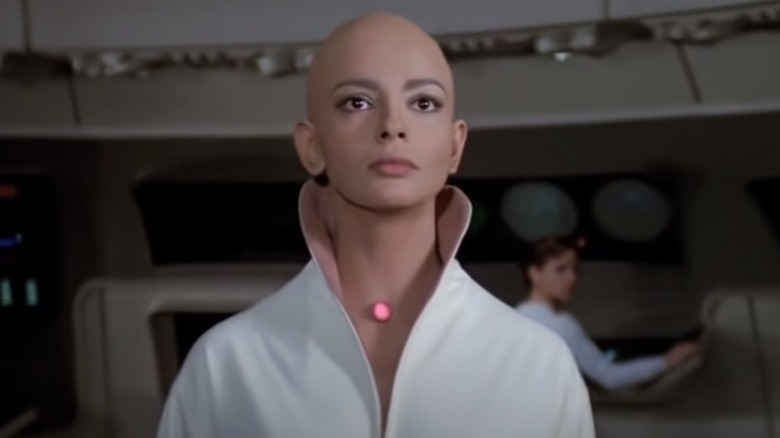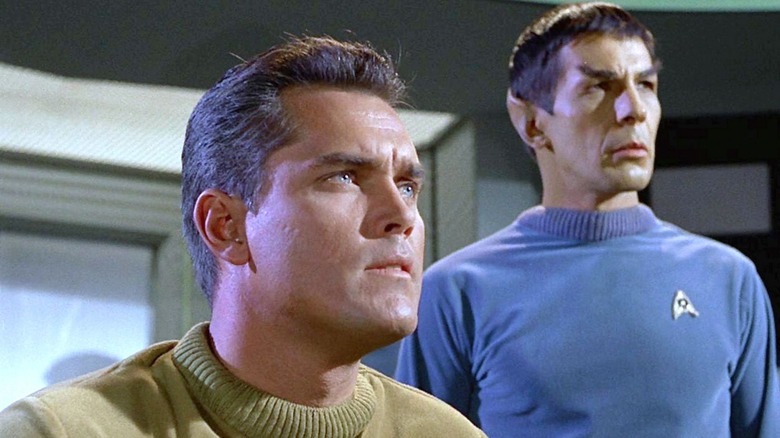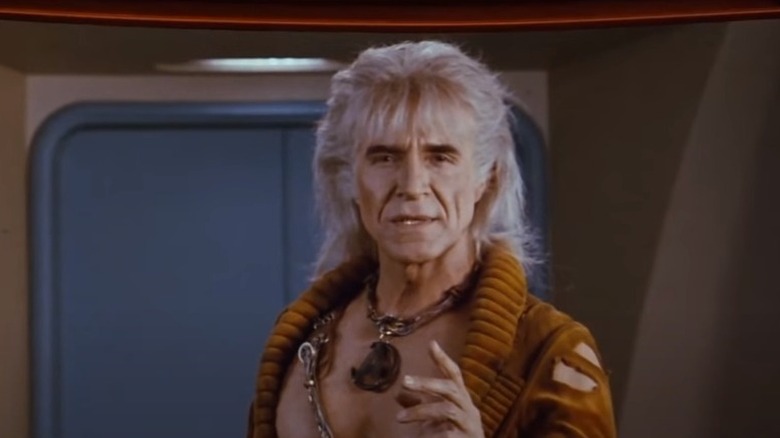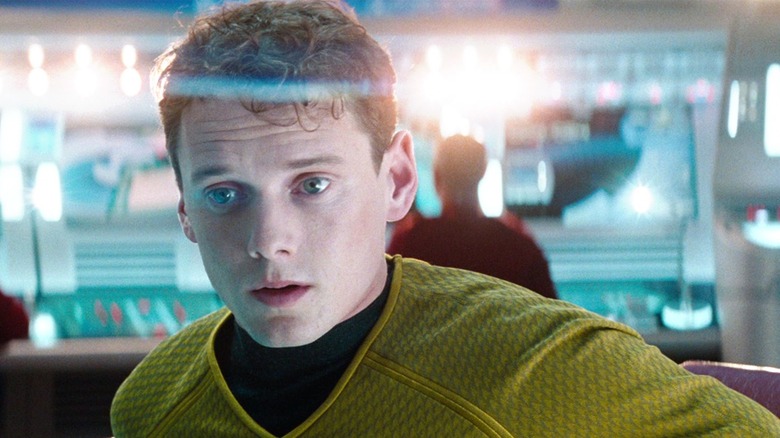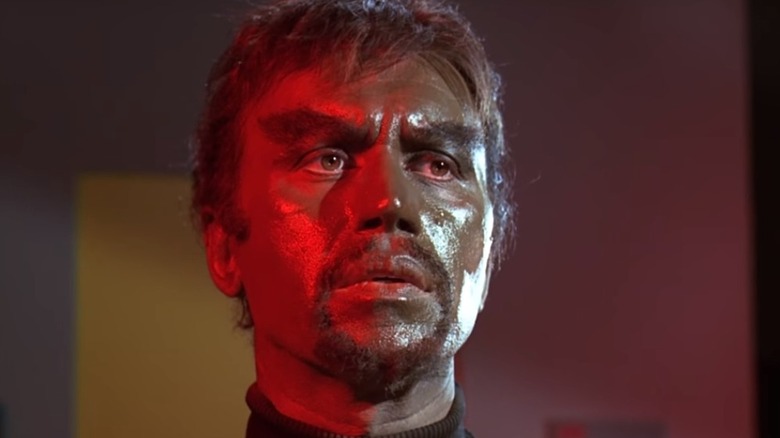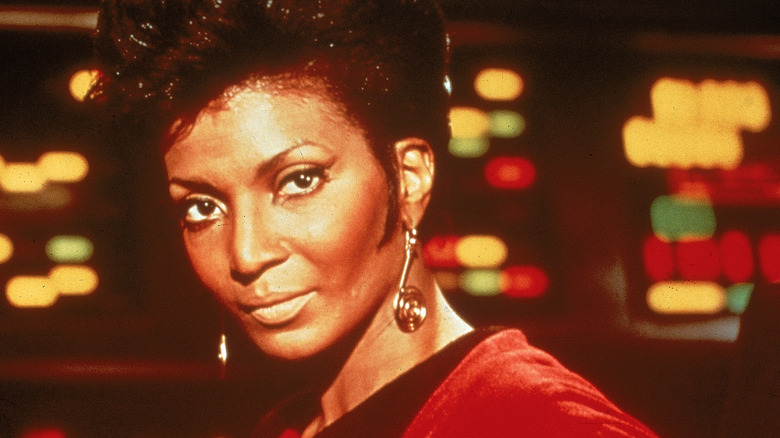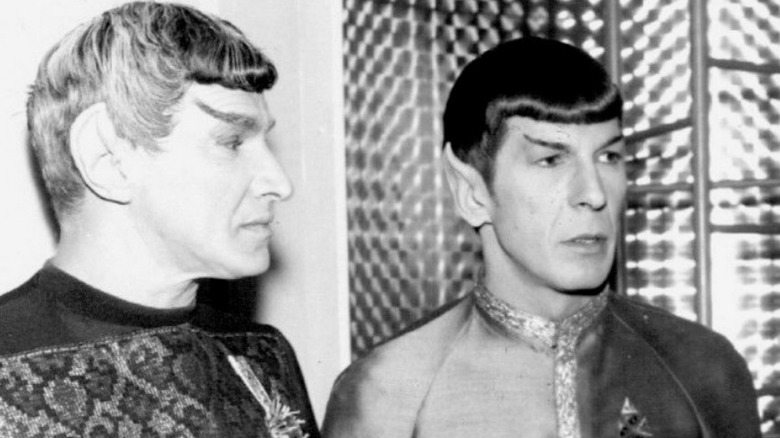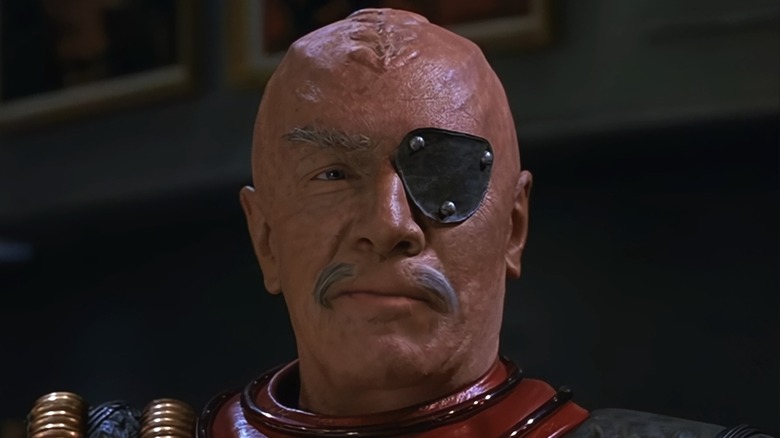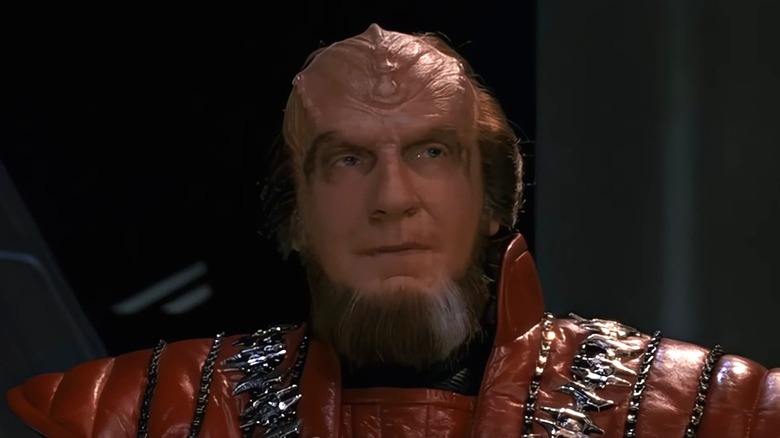Where These Star Trek Stars Are Buried
We may receive a commission on purchases made from links.
On Thursday, September 8, 1966, writer-producer Gene Roddenberry took TV audiences to the final frontier for the first time with the premiere of "Star Trek." Although science fiction wasn't new to television, it had been mostly treated as kiddie fare more suited for drive-in "B" movies than serious adult entertainment. With the notable exception of Rod Serling's "The Twilight Zone," sci-fi on the tube failed to live up to the promise of authors like Robert Heinlein and Arthur C. Clarke, who were leading a science fiction revolution in literature.
"Star Trek" changed everything. Within the context of a space adventure, the show strove for an unprecedented degree of scientific accuracy in its futuristic technology, which led to "Star Trek" sometimes predicting the future. Yet, "Star Trek" was much more than just phasers and starships. Kids may have tuned in for the monsters and space battles, but older viewers came back for the drama and the allegory.
For more than 50 years, "Star Trek," in its many film and TV incarnations, has been a celebration of the human adventure. Much of its success lies in the talented people who brought the show's iconic characters to life. Sadly, in the decades since its debut, many of "Star Trek's" principal and supporting actors have died, leaving generations of fans to mourn their loss. In tribute to these beloved fallen heroes and villains of one of the most popular science fiction franchises of all time, here are the final resting places of some of "Star Trek's" brightest stars.
DeForest Kelley (Dr. Leonard 'Bones' McCoy)
With the health and well-being of the Enterprise crew in his hands, Dr. Leonard "Bones" McCoy, played by DeForest Kelley, approached his duties with a fiery emotion that never failed to draw the irritation of the logical Mr. Spock. Prior to "Star Trek," DeForest Kelley was best known for portraying villains in Hollywood Westerns. Although Kelley had been typecast in bad-guy roles, he was Gene Roddenberry's first choice to play the Enterprise's crotchety ship's doctor. Nonetheless, Kelley missed out on appearing in either of "Star Trek's" two pilots. He at last joined the cast for "The Corbomite Maneuver," the first regular episode to be shot.
Had the Kelley family finances been better, young DeForest might have become a doctor in real life, fulfilling the dream of his Baptist minister father. Although a medical degree ultimately eluded him, Kelley inspired many to enter the medical field through his role as Dr. McCoy. "These people are doctors now, all kinds of doctors who save lives,” Kelley told The Houston Chronicle a year before his death (via the The New York Times). ”That's something that very few people can say they've done. I'm proud to say that I have.”
On June 11, 1999, Deforest Kelley died of stomach cancer at Los Angeles' Motion Picture and Television Fund Hospital. He was 79. Kelley was cremated and his ashes were scattered over the Pacific Ocean.
James Doohan (Chief Engineer Montgomery Scott)
Canadian-born actor James Doohan will forever be remembered as the Enterprise's "miracle worker," Chief Engineer Montgomery Scott. Affectionately known as "Scotty," Mr. Scott saved the Enterprise crew countless times by pushing his beloved warp engines to breaking point.
World War II veteran Doohan landed at Juno Beach during the D-Day invasion. After personally dispatching two German snipers, he was injured by friendly machine gun fire. Shot six times, Doohan took four bullets to his right leg, and another severed his right middle finger. A potentially fatal round struck Doohan in the chest, but was deflected by a silver cigarette case.
On July 20, 2005, Doohan died of pneumonia and complications from Alzheimer's disease at the age of 85. A portion of Doohan's cremated remains was launched into space on a SpaceX Falcon 9 rocket in 2012. Another portion of the actor's cremains was secretly smuggled aboard the International Space Station in laminated photocards of Doohan, hidden in the flight data file of entrepreneur and citizen astronaut Richard Garriott. With the blessing of Doohan's son, Chris, who concocted the scheme, Garriott floated one of the cards into space and hid another under the cladding on the floor of the ISS' Columbus module. "As far as I know, no one has ever seen it there and no one has moved it," Garriott told USA Today. "James Doohan got his resting place among the stars."
Leonard Nimoy (Mr. Spock)
No character in the "Star Trek" franchise is as recognized or loved by fans as the half-Vulcan, half-human Mr. Spock, as portrayed by Leonard Nimoy. Cool, unemotional, and highly logical, Spock is second-in-command of the USS Enterprise, the right hand of Captain James T. Kirk, and a friendly foil to Dr. McCoy.
As detailed in Nimoy's autobiography, "I Am Spock," the actor found his runaway fame difficult early on. "I was overwhelmed by all the attention. Overwhelmed, flattered, excited — and terrified," Nimoy wrote. Seeking to draw a line between himself and the character, Nimoy wrote his first autobiography, "I Am Not Spock," in 1975. That title caused an uproar among "Star Trek" fans, leading many to believe he hated the character. Two decades later, Nimoy explained his true feelings about his complicated relationship with Spock, writing, "I don't hate the Vulcan. ... If someone came up to me and said, 'You can't be Leonard Nimoy anymore. But you can be anyone else you want,' I wouldn't hesitate a beat with my answer. I'd want to be Spock."
Nimoy died at the age of 83 in his Bel Air home on February 27, 2015, of chronic obstructive pulmonary disease. Diagnosed with the condition a year prior, Nimoy cited his smoking habit, which he had kicked 30 years before, as the cause. Nimoy is buried at Hillside Memorial Park in Culver City, California, a Jewish cemetery that is also the final resting place of Lorne Greene, Jack Benny, and Michael Landon.
Grace Lee Whitney (Yeoman Janice Rand)
Grace Lee Whitney may have appeared in just eight episodes of "Star Trek's" first season, but as Yeoman Janice Rand, she figured prominently in some of the show's most memorable stories. However, Whitney's early exit from "Star Trek" is one of the most notorious controversies in the series' history. Whitney, under pressure to maintain her figure and embroiled in tumultuous relationships, turned to alcohol and diet pills. Ultimately, Whitney's struggles with substance misuse resulted in her dismissal from the series. Her character was written out of the show because her presence precluded Kirk from pursuing other romantic interests.
In her memoir, "The Longest Trek," Whitney describes a sexual assault she suffered at the hands of an unnamed executive as precipitating her exit from "Star Trek" and her addiction issues. "I tried to do what he wanted me to, so I could get it over with," Whitney wrote. "I knew, deep down inside, that I was finished on 'Star Trek.' At that moment, however, I didn't care about that. ... The only thing that mattered was getting out of that room alive."
Whitney eventually overcame her demons to become a popular figure at "Star Trek" conventions in the 1980s. She also returned for four "Star Trek" films and appeared as Rand in a 1996 episode of "Star Trek: Voyager." Whitney died of natural causes aged 85 at her home in Coarsegold, California, on May 1, 2015. She was cremated and her ashes are in the possession of her family.
If you or anyone you know needs help with addiction issues or has been a victim of sexual assault, contact the relevant resources below:
-
The Substance Abuse and Mental Health Services Administration website or contact SAMHSA's National Helpline at 1-800-662-HELP (4357).
-
The Rape, Abuse & Incest National Network website or contact RAINN's National Helpline at 1-800-656-HOPE (4673).
Majel Barrett (Nurse Christine Chapel/ Lwaxana Troi)
Nobody was closer to "Star Trek's" creator Gene Roddenberry and his legacy than his wife, Majel Barrett. Known as the "First Lady of Star Trek," Barrett met her future husband in the early 1960s when she was an up-and-coming actress. The pair became friends, and Roddenberry would cast her in a guest role on his TV military drama "The Lieutenant." Roddenberry was still married to his first wife, Eileen, when he began a romantic relationship with Barrett in 1962. The couple married in 1969.
In 1964, Roddenberry cast Barrett (billed under her birth name, Majel Leigh Hudec) as Number One, the calmly authoritative first officer of the starship Enterprise, in "Star Trek's" first pilot "The Cage." In addition to her role in the pilot, Barrett portrayed Nurse Christine Chapel in the original series as well as the animated "Star Trek" series, in which she also provided the voice of catlike communications officer M'Ress, and in two of the "Star Trek" films. She also voiced the ship's computer in all the televised versions of "Star Trek" prior to "Star Trek: Discovery." Fans of "Star Trek: The Next Generation" and "Star Trek: Deep Space Nine" best remember Barrett as Lwaxana Troi, the meddling, outspoken mother of the Enterprise's counselor Deanna Troi.
Majel Barrett Roddenberry died of leukemia on December 18, 2008, at the age of 76. Her ashes and a portion of her husband's cremains were launched into deep space by Celestis Memorial SpaceFlights in January 2024.
William Campbell (Trelane/ Commander Koloth)
William Campbell was a familiar face to TV viewers and movie audiences long before portraying two of the most iconic villains in "Star Trek." Campbell appeared alongside Elvis Presley in the singer's 1956 film debut "Love Me Tender," starred in director Francis Ford Coppola's first feature film "Dementia 13," and played a supporting role in the 1964 Bette Davis thriller "Hush...Hush, Sweet Charlotte."
In his first appearance in the episode "The Squire of Gothos," Campbell played Trelane, a powerful alien in the guise of a foppish 18th-century English dandy, who hopes to add the Enterprise and its crew to his collection of artifacts. Campbell exercises both his comedic and dramatic chops as the impetuous squire, who is revealed to be the misbehaving child of two non-corporeal beings in the episode's climax. Campbell returned in the fan-favorite second season episode "The Trouble With Tribbles" as Klingon Commander Koloth. Campbell reprised the role in the 1994 "Star Trek: Deep Space Nine" episode "Blood Oath," in which he appeared with original series Klingons Kor (John Colicos) and Kang (Michael Ansara).
Campbell died of natural causes on April 28, 2011, at the Motion Picture and Television Hospital in California. He was 87 years old. Campbell is interred at Forest Lawn Memorial Park in Los Angeles.
Roger C. Carmel (Harcourt Fenton Mudd)
Decades after his first appearance, Harcourt Fenton "Harry" Mudd remains one of "Star Trek's" most popular characters. A 23rd-century grifter, conman, smuggler, and all-around scoundrel, Mudd was portrayed by character actor Robert C. Carmel in the first season episode "Mudd's Women." Although that episode ended with his arrest, the Enterprise crew had not seen the last of Harry Mudd. The cosmic rapscallion returned the next year as the "ruler" of a planet of androids in "I, Mudd."
Carmel, who began his acting career on Broadway, was a ubiquitous presence on 1960s television, appearing on shows as varied as "Route 66" and "The Dick Van Dyke Show." Aside from Harry Mudd, Carmel's greatest claim to fame was a role on the 1967 NBC sitcom "The Mothers-In-Law." Carmel continued to appear as a guest star on several comedies throughout the 1970s and '80s, but by the end of his life, he was relegated to commercial work as a pitchman for Naugles restaurants.
Roger Carmel died in November 1986, aged just 54, at his West Hollywood condominium. Although there were rumors of a drug overdose and death by suicide, the official cause was reported as hypertrophic cardiomyopathy, a thickening of heart tissue leading to cardiac arrest. Carmel is buried at Mount Carmel Cemetery in Glendale, New York.
If you or someone you know is struggling or in crisis, help is available. Call or text 988 or chat 988lifeline.org
Persis Khambatta (Lieutenant Ilia)
The original "Star Trek" was canceled by NBC after just three seasons, but it found new life in syndicated television. By the late 1970s, the show had been sold into over 150 domestic markets and nearly 60 international markets. Despite its cancellation, fans had transformed "Star Trek's" failure into an unprecedented success, and its return to the screen seemed inevitable.
In 1977, Paramount announced the launch of a fourth network, and its flagship program was to be a revived "Star Trek." Sets were built, costumes were designed, and much of the original cast was slated to return. New characters would also join the crew, and among them was Ilia, a bald, beautiful, and highly intelligent alien from the planet Delta IV, to be portrayed by former Miss India, Persis Khambatta. Unfortunately, the network never materialized and many of the resources for the show were poured into making the first "Star Trek" film. Much of the plot for 1979's "Star Trek: The Motion Picture" would hinge on Khambatta, whose character is abducted from the Enterprise by the machine entity V'Ger. After "Star Trek: The Motion Picture," Khambatta appeared in the 1981 Sylvester Stallone action film "Nighthawks" and a number of "B" grade genre pictures.
Khambatta died of a heart attack in Mumbai, India, on August 18, 1998, aged just 49. She was cremated and her ashes scattered.
Jeffrey Hunter (Captain Christopher Pike)
Jeffrey Hunter portrayed Christopher Pike, captain of the USS Enterprise and James T. Kirk's predecessor, in "Star Trek's" first pilot, "The Cage." Much of the footage from "The Cage" was incorporated into the Hugo award-winning, two-part episode "The Menagerie," which elaborated on Spock's relationship with his former commanding officer and the tragic fate that befell him.
Hunter appeared in a number of popular films throughout the 1950s and '60s, including the classic Howard Hawks Western "The Searchers." He also appeared as Jesus in the 1961 epic "King of Kings," one of the most controversial movies based on the Bible. On May 26, 1969, Hunter, aged 42, was found unconscious after an apparent fall in his home. He died the following day after undergoing emergency brain surgery, and Hunter's autopsy revealed that the actor had suffered a stroke. The previous year, Hunter had been injured in an explosion on a film set, and in the months before his death, he had complained of dizziness and headaches that were likely due to cerebral hemorrhaging. He is buried at Glen Haven Memorial Park in Sylmar, California.
Ricardo Montalbán (Khan Noonien Singh)
Mexican-born actor Ricardo Montalbán also played one of "Star Trek's" most compelling villains: Khan Noonien Singh, a genetically engineered tyrant from Earth's past. In the first season episode "Space Seed," Kirk and company discover Khan and his army of superhumans in suspended animation aboard a derelict late 20th-century sleeper ship. Once revived, Khan attempts to take over the Enterprise, but Kirk eventually bests Khan and exiles the would-be dictator to an uninhabited planet.
Montalbán was also well known for his role as the enigmatic Mr. Roarke on the 1970s ABC drama "Fantasy Island," and for extolling the virtues of "fine Corinthian leather" in a series of ads for the Chrysler Cordoba. Montalbán returned as Khan in the 1982 feature film "Star Trek II: The Wrath of Khan," in which Khan hijacks a Federation starship in a bloody attempt to wreak vengeance on his old enemy, James T. Kirk.
In stark contrast to his character Khan, Montalbán founded the nonprofit advocacy group Nosotros Foundation in 1970, and was a fierce supporter of Latino representation in Hollywood. "He paved the way for being outspoken about the images and roles that Latinos were playing in movies," author Luis Reyes told the Los Angeles Times. On January 14, 2009, 88-year-old Montalbán died in his Los Angeles home from natural causes. He is buried at Holy Cross Cemetery in Culver City, California.
Anton Yelchin (Ensign Pavel Chekov — Kelvin timeline)
Anton Yelchin became part of "Star Trek" history in 2009, when he took on the role of Starfleet Ensign Pavel Chekov, the Enterprise's eager Russian-born navigator in J.J. Abrams' alternate timeline reboot.
Yelchin was born in Leningrad, now St. Petersburg, in the former Soviet Union on March 11, 1989. When he was 6 months old, he emigrated to the United States with his parents, noted figure skaters Irina and Victor Yelchin. A versatile actor with an eclectic list of credits, Yelchin appeared in everything from indie fare like Jim Jarmusch's moody vampire drama "Only Lovers Left Alive" to big-budget genre pictures such as "Terminator Salvation."
Tragically, Yelchin was one of several actors who died in bizarre ways, when he was killed aged 27 on June 19, 2016, from being crushed between his vehicle and a brick pillar at his Los Angeles home. Yelchin is buried at Hollywood Forever Cemetery, and his grave is marked by a life-sized statue in his likeness.
Michael Ansara (Commander Kang)
Actor Michael Ansara played Commander Kang in the third season episode "Day of the Dove," which found the Enterprise crew locked in battle with swords against the Klingons. When Kirk and Kang discover they're under the influence of an entity that feeds on negative emotions, they join forces to laugh the malevolent energy being off the Enterprise. Ansara would return as a much older Kang on both "Star Trek: Deep Space Nine" and "Star Trek: Voyager."
Syrian-born Michaele Ansara was frequently cast in Native American roles on TV and in film during the 1950s and '60s. In the 1990s, Ansara lent his distinctive voice to the villain Mr. Freeze on "Batman: The Animated Series." On July 31, 2013, Ansara died at his home in Calabasas, California. The 91-year-old actor died from complications of Alzheimer's disease. He is buried at LA's Forest Lawn Memorial Park.
Nichelle Nichols (Lieutenant Uhura)
If anyone boldly went where no one had gone before, it was Nichelle Nichols. Lieutenant Uhura was a constant in "Star Trek: The Original Series," hailing other space vessels on the bridge of the Enterprise — but her role was far bigger than that. Nichols would go on to work with NASA to recruit women and minorities into spaceflight training. This tangible, direct impact must have been gratifying to see, but in reality, it's impossible to count how many people around the world were inspired by her portrayal.
In the 23rd century, Earth seems to have transcended racism, but in 1966 — when "Star Trek" premiered — that vision of the future was as alien as Vulcan. Nichols's character, the first to have an interracial kiss on television, was such an important trailblazer that Dr. Martin Luther King Jr. himself urged her not to leave the show. When Nichols walked into the audition, her character didn't even have a name. It was Nichols who suggested "Uhura," derived from the Swahili word for freedom.
Nichelle Nichols died in 2022 at the age of 89, and shortly afterwards, her remains left our planet, too. Her ashes were sent into deep space to orbit the sun far from the influence of Earth's gravity. She leaves behind an enduring legacy and, in the form of dozens of episodes of "Star Trek," a dream of a future where a Black woman flies among the stars, helping the human race explore and communicate with worlds beyond our own.
Mark Lenard (Sarek)
Acclaimed stage actor Mark Lenard is probably most recognizable to the general public from his role as Spock's Vulcan father, who broke with tradition to marry a human. He appeared in Shakespeare plays, performed on Broadway, and was in famous films like "Annie Hall," and he approached "Star Trek" with the same gravitas as Chayefsky and Ibsen. He stated in an interview with Starlog magazine (via StarTrek.com), "I have asked all over the world what there is about Star Trek that has made it unique among SF shows ... Star Trek had a particular meaning, and it was the right time for that meaning."
As beloved as Lenard is in the "Star Trek" community, he had a bigger role in its history than some may realize on first viewing. Fans rewatching "Star Trek" should keep an eye out for Lenard, as even though he had a recurring role as Spock's father Sarek, he also appeared as two other characters. One of those characters was a Klingon and the other a Romulan, so he is believed to be the only actor to appear as three different species in any iteration of "Star Trek."
Lenard died in 1996 of a blood cancer known as multiple myeloma. He was 72 years old. Although he lived in Manhattan and his children lived in Boston and Oklahoma City at the time of his death, his remains can be found at Hebrew Cemetery in South Haven, Michigan.
Christopher Plummer (General Chang)
Christopher Plummer died at the age of 91, after a decades-long career on stage, in film, and on television, and his cremated remains were entrusted to the care of his loved ones. Plummer is probably most recognizable to the general public as Georg von Trapp, but how he really felt about "The Sound of Music" might come as a surprise. He actually despised the film and his part in it, and stated to People magazine (via The New York Times) in 1982, "To do a lousy part like von Trapp, you have to use every trick you know to fill the empty carcass of the role."
His general disdain for sentimentality in film did not extend to "Star Trek." In 1991, the acclaimed actor took on the role of the eyepatch-wearing Klingon general Chang. He had already been a fan of the "Star Trek" universe for years, stating that had been watching the series from when it first came out. In fact, he even called himself a Trekkie.
David Warner (St. John Talbot/ Gorkon/ Madred)
Renowned character actor David Warner died in 2022 at the age of 80, due to health complications associated with his cancer diagnosis. It is not known where Warner's final resting place might be, but he was cremated and his ashes given to his family. He had a career that lasted around six decades as a theater actor, a television and film star, and a voice actor. While he began his career with Shakespeare, he would go on to perform in many different genres. His most beloved roles may have been in nerdy cult classics like "Time Bandits," "Twin Peaks," "Doctor Who," and "Star Trek."
Warner appeared in "Star Trek V: The Final Frontier" as St. John Talbot, as the Klingon chancellor Gorkon in "Star Trek VI: The Undiscovered Country," and in two fan-favorite episodes of "Star Trek: The Next Generation" as a sinister Cardassian interrogator named Madred. In a 2011 interview with StarTrek.com, Warner admitted that he didn't have a lot of experience with "Star Trek" before being cast, and he only had around three days to prepare for his role as Madred. In order to get the lines right, many of which included references to things in the "Star Trek" universe that Warner couldn't have known about without watching the series, he had to read them off of cue cards hidden offscreen. He remarked: "I got the makeup on, read the lines and hoped for the best. And it turned out to be a classic episode. Isn't that nice?"
